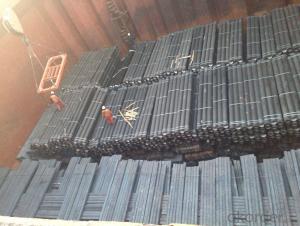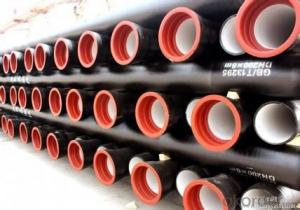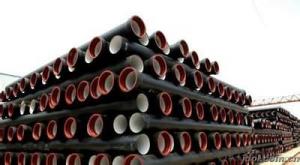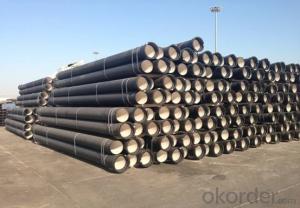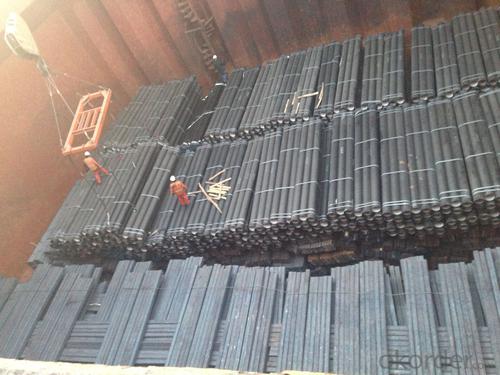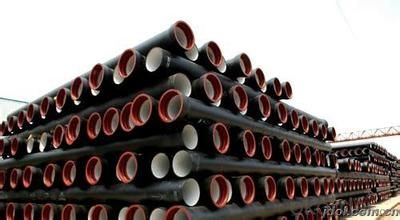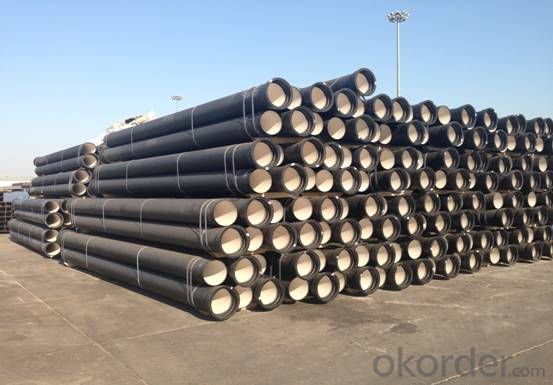DUCTILE IRON PIPE K9 DN150
- Loading Port:
- China Main Port
- Payment Terms:
- TT OR LC
- Min Order Qty:
- -
- Supply Capability:
- -
OKorder Service Pledge
OKorder Financial Service
You Might Also Like
Ductile Iron Cast Pipe is without any defects compare with tradition casting tech, which has many advantages particularly as follow:
(1) High density. In the "vertical upward casting" process, the melt iron of centre liquid column in center crystallizer is continuously feeding for volume shrinkage caused by condensation tube at outer circumference , which lead to be free of shrinkage porosity.
(2) High purity. When melt iron pouring, the mixed impurities such as gas, dross, sand grain which are lighter than melt iron could be eliminated at furnace mouth, its impossible to enter into the crystallizer through the channel, so the melt iron into the crystallizer is very pure.
(3) Strength with toughness. The cooling speed provided by continuous crystallizer is 30 times than sand casting and 5 times than centrifugal casting, and doesn't produce white iron, the eutectic cell volume of continuous cast iron is one eighth to one tenth compare with traditional cast iron. The density of graphite nodule in ductile iron can reach 300-700 pcs/mm2. Therefore, all reason above improve the strength and toughness of continuous cast iron.
(4) Free machining. The high speed cooling make the hardening phase (such as boride, steadite) not appear like reticular, massive or thick, but diffuse like fish bone and pane in shape, moreover, there are tiny graphite flakes inlaid hardening phase. It's free machining in BrinellHardness the range of 250-300HB. However, the Brinell Hardness of 250 is top limit to common metal materials.
(5) Uniform composition of tube wall. The convection mixing of liquid column caused by marching type drawing in crystallizer make the composition of tube wall well-distributed, and concentration gradient very little.
(6) High productivity. To the wall thickness of tube under 10mm, the speed of continuous casting is 1 meter/min, to the wall thickness of tube under 20mm, the speed of continuous casting is 0.5 meter/min, which is high efficiency that centrifugal or other casting tech couldn't reach.
- Q: Can ductile iron pipes be used in geothermal systems?
- Yes, ductile iron pipes can be used in geothermal systems. Ductile iron is known for its strength and durability, making it suitable for various applications including geothermal systems. It can withstand high temperatures and pressures, making it an ideal choice for transporting hot fluids or steam in geothermal systems. Additionally, ductile iron pipes have excellent corrosion resistance, which is crucial in geothermal environments where the fluids can be chemically aggressive.
- Q: Can ductile iron pipe be used for horizontal directional drilling?
- Yes, ductile iron pipe can be used for horizontal directional drilling (HDD). HDD is a trenchless method of installing underground utilities, such as pipelines, without the need for traditional open-cut trenching methods. Ductile iron pipe is often used in HDD projects due to its strength, durability, and ability to withstand the stresses and strains associated with directional drilling. It has excellent resistance to external loads and can withstand the bending and pulling forces involved in HDD installations. However, it is important to consider factors such as pipe diameter, wall thickness, and soil conditions to ensure proper pipe selection for HDD projects. Additionally, proper installation techniques and precautions should be followed to ensure the long-term performance and integrity of the ductile iron pipe in HDD applications.
- Q: Can ductile iron pipes be used in areas with high levels of hydrogen sulfide gas and corrosion potential?
- Ductile iron pipes can be used in areas with high levels of hydrogen sulfide gas and corrosion potential, but it is important to consider certain factors before making a decision. Ductile iron pipes have a high resistance to corrosion, especially when they are properly protected with external coatings and linings. This makes them suitable for environments with moderate levels of hydrogen sulfide gas and corrosion potential. However, in areas with extremely high levels of hydrogen sulfide gas and severe corrosion potential, other materials like corrosion-resistant alloys or specially coated pipes may be more appropriate. It is crucial to conduct a thorough evaluation of the specific conditions in the area to determine the suitability of ductile iron pipes. Factors such as the concentration of hydrogen sulfide gas, the presence of other corrosive elements or chemicals, and the overall corrosiveness of the environment should be considered. Additionally, the local regulations and industry standards must be consulted to ensure compliance and safety. In conclusion, while ductile iron pipes can withstand moderate levels of hydrogen sulfide gas and corrosion potential, a comprehensive assessment of the specific conditions is necessary to determine their suitability. Consulting with experts in the field and considering alternative materials may be required in areas with high levels of hydrogen sulfide gas and severe corrosion potential.
- Q: What are the typical surge anticipation measures for ductile iron pipe?
- To mitigate potential damage caused by surges or water hammer in ductile iron pipe systems, various techniques can be employed. These measures aim to absorb or redirect sudden pressure changes, preventing pipe rupture or failure. Common surge anticipation measures for ductile iron pipe include: 1. Incorporating air chambers strategically along the pipeline to create a cushion of air that absorbs surge energy. As the pressure wave travels through the pipe, the air compresses, reducing the impact on the pipe and minimizing the risk of damage. 2. Connecting surge tanks, which act as storage reservoirs for excess pressure, to the pipeline. When a surge occurs, the surge tank absorbs the excess water volume, preventing damage to the pipe. The stored water is gradually released back into the system, stabilizing the pressure. 3. Installing surge relief valves in the pipeline to automatically release excess pressure during surge events. These valves open when the pressure exceeds a preset limit, allowing the surge to dissipate harmlessly. Surge relief valves can be adjusted to release the desired amount of pressure, ensuring the safety of the ductile iron pipe. 4. Utilizing water hammer arrestors, which are devices that absorb the shock generated by surges and water hammer. These devices consist of sealed chambers filled with a compressible gas or liquid that absorbs sudden pressure changes. By absorbing the energy, water hammer arrestors protect the ductile iron pipe from potential damage. 5. Using surge suppressors, devices that regulate the flow of water during surge events. Surge suppressors are designed to reduce the speed at which surges travel through the pipe, minimizing the impact on the system. These devices can be installed at critical points in the pipeline to prevent damage to the ductile iron pipe. To determine the most suitable surge anticipation measures for ductile iron pipe installations, it is important to consider the specific requirements of the pipeline system and consult experienced engineers or industry professionals.
- Q: Can ductile iron pipes be used in contaminated groundwater systems?
- Contaminated groundwater systems can indeed utilize ductile iron pipes. Renowned for their strength and durability, ductile iron pipes are versatile and applicable in various settings, including water and wastewater systems. These pipes possess corrosion-resistant properties that safeguard against both internal and external corrosion, thus ensuring reliable water transportation, even in the presence of contaminated groundwater. When addressing contaminated groundwater, it becomes imperative to assess the extent and nature of the contamination. Ductile iron pipes exhibit resistance to numerous common chemicals typically found in groundwater, including specific acids and alkalis. However, in instances of severe or specific chemical contamination, it may be necessary to explore alternative pipe materials that offer superior resistance to those particular substances. Moreover, the proper installation and maintenance of ductile iron pipes are vital for their long-term performance within contaminated groundwater systems. Regular inspections, cleaning, and the use of suitable protective coatings can effectively mitigate any potential risks associated with contamination. In conclusion, ductile iron pipes can be effectively employed in contaminated groundwater systems, provided that the level and type of contamination fall within acceptable limits and appropriate installation and maintenance practices are observed. It is always advisable to seek guidance from experts and consider local regulations and guidelines when determining the suitability of pipe materials in specific groundwater systems.
- Q: What are the disadvantages of using ductile iron pipe?
- There are several disadvantages associated with using ductile iron pipe. Firstly, one major drawback is its cost. Ductile iron pipe tends to be more expensive than other types of piping materials such as PVC or even traditional cast iron. This can make it less appealing for projects with strict budget constraints. Secondly, ductile iron pipe is relatively heavy compared to other materials. This makes it more difficult to handle and install, requiring specialized equipment and additional labor. The weight can also make it more susceptible to damage during transport and installation. Another disadvantage is its susceptibility to corrosion. While ductile iron is more resistant to corrosion than traditional cast iron, it is still prone to rust and deterioration over time. This can lead to reduced lifespan and potential leaks or pipe failures. Additionally, ductile iron pipe has limited flexibility and is not as resistant to ground movement or settlement. This can result in cracking or breaking of the pipe, especially in areas with unstable soil conditions or seismic activity. Lastly, ductile iron pipe can have a rough interior surface, which can lead to increased friction and reduced flow capacity. This can result in higher pumping costs and decreased efficiency in fluid transportation. Overall, while ductile iron pipe has its advantages, such as its strength and durability, these disadvantages should be carefully considered when choosing the appropriate piping material for a specific project.
- Q: Deep well spiral iron pipe, or ductile iron tube?
- Ductile iron pipes mainly called centrifugal ductile iron pipe, it has the properties of nature, iron and steel, excellent corrosion resistance, good ductility, good sealing effect, simple installation, mainly for municipal, industrial and mining enterprises, water supply, gas, oil etc.. Water supply pipe is the first choice, with high cost performance. Compared with the PE pipe, from the installation time, ductile pipe PE pipe installation is simple and rapid, and after the installation of internal and external pressure bearing better tightness and corrosion resistance; from the point of view, ductile pipe sealing better after installation, but also can improve the corrosion resistance of corrosion protection through a variety of means; from the hydraulic performance, because ductile pipe specifications generally refers to the inner diameter of PE pipe diameter specifications generally refers to the same specifications, because under the condition of ductile pipe can achieve greater runoff; from the installation and maintenance cost, ductile pipe have more favorable price. The main components of ductile iron pipes are carbon, silicon, manganese, sulfur, phosphorus and magnesium. The inner wall of zinc spray, anti-corrosion materials such as cement mortar.
- Q: Can ductile iron pipes be used in areas with high soil erosion?
- Due to their inherent strength and durability, ductile iron pipes can be utilized in regions with substantial soil erosion. Ductile iron, a type of iron treated with graphite nodules, enhances its flexibility and tensile strength, rendering it highly resistant to cracking and breaking, even in extreme conditions. In areas with high soil erosion, the ground tends to shift and move, imposing significant stress on underground pipes. Nevertheless, ductile iron pipes exhibit high resistance to external loading and can endure the pressures exerted by the surrounding soil. Their reliability in such environments has been extensively tested and proven. Moreover, ductile iron pipes boast a lengthy lifespan, often exceeding 100 years, making them a cost-effective choice for areas with substantial soil erosion. Their corrosion resistance and structural integrity render them suitable for installation in diverse soil conditions, including those susceptible to erosion. It is crucial to note that proper installation techniques, like employing appropriate bedding and backfill materials, must be adhered to in order to ensure the optimal performance of ductile iron pipes in areas with high soil erosion. Additionally, regular inspection and maintenance should be carried out to promptly identify any potential issues and prevent damage resulting from soil erosion. All in all, ductile iron pipes serve as a dependable and durable option for regions with high soil erosion, providing enduring and efficient water distribution and wastewater management systems.
- Q: Can ductile iron pipes be used for gravity flow applications?
- Ductile iron pipes are suitable and widely used for gravity flow applications. Renowned for their strength, durability, and flexibility, these pipes are perfect for a variety of uses, such as gravity flow systems. They are commonly employed in water and wastewater systems, storm drainage systems, and other applications that necessitate resistance to high internal and external pressures. The pipes possess the capability to bear the weight of the flowing fluid without any supplemental support, which makes them a dependable choice for gravity flow applications. Furthermore, their ability to resist corrosion ensures long-term performance in both underground and exposed environments. In conclusion, ductile iron pipes are an excellent option for gravity flow applications.
- Q: What is the typical lifespan of ductile iron pipes?
- The typical lifespan of ductile iron pipes can range from 75 to 100 years, depending on various factors such as the quality of the installation, maintenance practices, and the conditions in which the pipes are exposed to.
Send your message to us
DUCTILE IRON PIPE K9 DN150
- Loading Port:
- China Main Port
- Payment Terms:
- TT OR LC
- Min Order Qty:
- -
- Supply Capability:
- -
OKorder Service Pledge
OKorder Financial Service
Similar products
Hot products
Hot Searches
Related keywords
